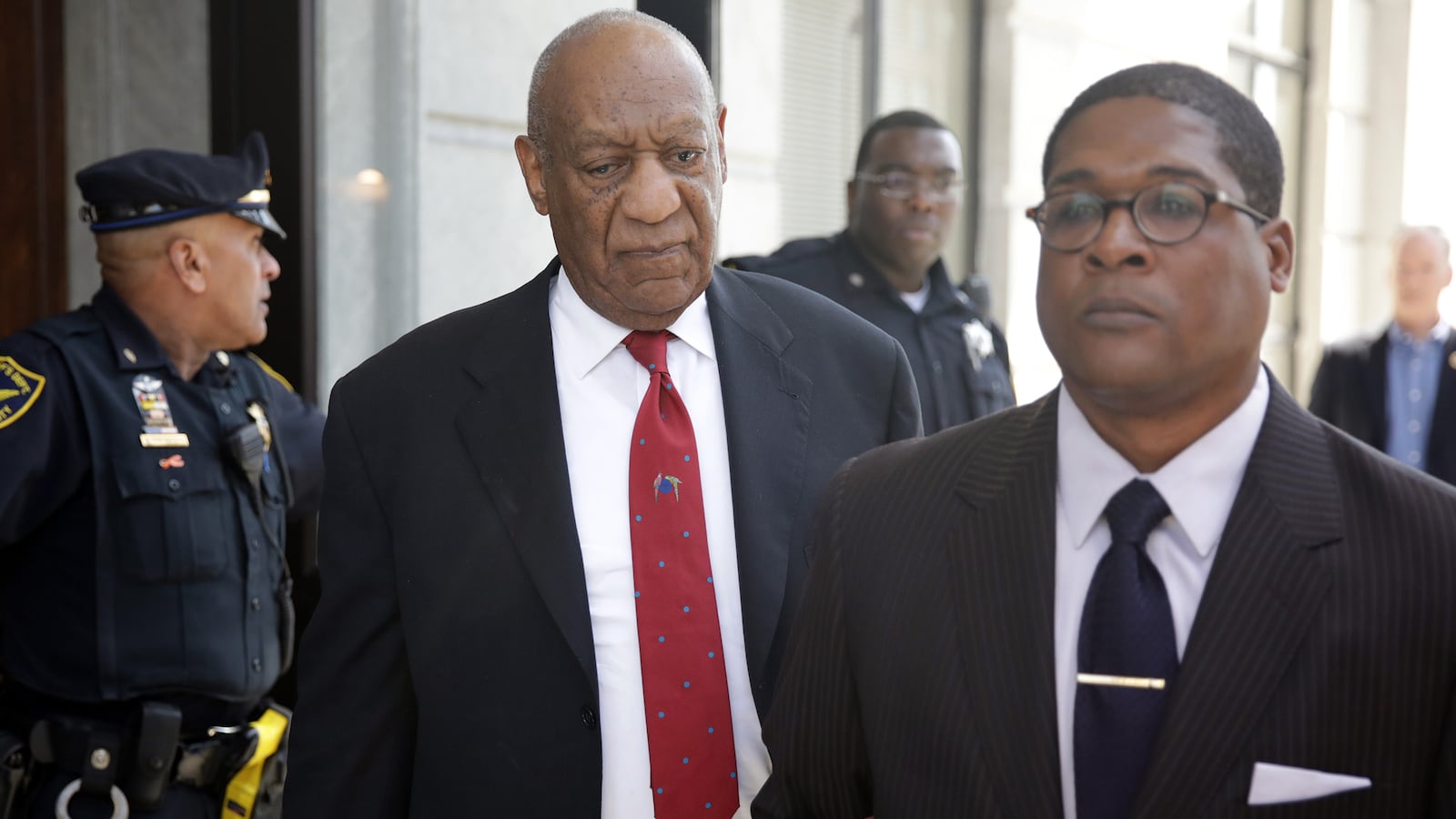NORRISTOWN, Pennsylvania—Bill Cosby was found guilty of all charges in a sexual assault trial by a jury on Thursday after 14 hours of deliberation.
Cosby was convicted of three counts of aggravated indecent assault for drugging and sexually assaulting Andrea Constand at his Elkins Park, Pennsylvania, home in January 2004.
Cosby, 80, faces up to 30 years in prison for the conviction on all counts. Even before the verdict, Cosby suffered an unimaginable fall from his perch as “America’s Dad” on the hit The Cosby Show in the 1980s after rising to prominence as one of America’s first mainstream black comedians.
Montgomery County District Attorney Kevin Steele immediately moved to revoke Cosby’s bail following the conviction, prompting an explosion from Cosby.
“Your Honor, he has the wealth to go any place in the world,” Steele told Judge Stephen O’Neill. “He’s got a plane.”
“He doesn’t have a plane, you asshole!” Cosby yelled back (he sold the plane some time ago, according to trial testimony).
O’Neill refused to budge and allowed Cosby to be released on bail before his sentencing hearing.
Chelan Lasha, who testified Cosby raped her in 1986, described her reaction to the verdict as “Speechless, emotional, happy, excited, overwhelming lifted. Just a smile on my face, tears of peace not of pain.”
Beth Ferrier, who says Cosby raped her in his dressing room in the 1980s, told The Daily Beast she was overjoyed.
“I am beyond thankful that the judge, prosecution, and jury have in fact shown the world that our lives matter and given sexual assault victims everywhere hope to not feel shame and guilt,” she said.
The first trial ended in a deadlock last year and the retrial began this month on April 9. Cosby is accused of sexually assaulting more than 60 women over the past 40 years, including Constand, but this was the lone criminal case.
The retrial was markedly different from the first trial in nearly every way in both substance and style. While the gender and racial makeup of the jury was the same (seven men and five women, two black and 10 white) it skewed younger and was local as opposed to the last jury brought in from across the state.
This time Cosby faced six accusers in court, instead of two. Constand’s testimony was more detailed, more graphic, and filled in gaps left open during the first trial. The details of her civil suit settlement with Cosby in late 2006, in which she got $3.38 million, were part of the record for the first time.
At the first trial, the defense did not present witnesses. This time they successfully fought to include one that was barred from the last trial, Marguerite Jackson, and a slew of others.
But the biggest change in the 10 months between the two trials was outside of the courtroom.
The #MeToo movement exploded in October 2017 when several and then dozens of women went public to say movie mogul Harvey Weinstein raped them. The public awakening of systematic and widespread sexual misconduct by men in power has since toppled more than 100 other men—but so far sent none of them behind bars.
So despite beginning three years before #MeToo, Cosby’s case is the first major conviction of the era. It remains unclear what impact the movement had on the verdict since the jurors were all screened for any bias.
Both sides in the case gave exhaustive, lengthy closing arguments that lasted all day Tuesday. Cosby’s defense team chose to blast the #MeToo movement comparing it to “witch hunts, lynchings, and McCarthyism.” They also attacked each of the five women who testified they were drugged and sexually assaulted by Cosby before Constand. The prosecution turned the defense’s closing arguments that Constand is a “con artist” back on them, saying it’s Cosby who was the con artist and called out the defense for attacking the accusers.
The prosecution started off their case by having a forensic psychiatrist and sexual assault expert testify about rape victims, setting the table for six women, including Constand, to testify about what Cosby allegedly did to them.
Dr. Barbara Ziv explained the often contradictory behavior of victims including why they don’t report sexual assault to the authorities, and explained it’s common in “non-stranger rapes” for victims to have some form of contact with their rapists afterward, especially if they work together.
Like Cosby.
There’s “a desire to be able to find a way to understand what happened; a desire to have something make sense; get an explanation, to have a narrative you can live with,” Ziv testified.
Former prosecutor Dennis McAndrews said he thought Riv was “much more effective” than the expert the prosecution used in the first trial.
“It was essential to have her testify at the outset,” McAndrews told The Daily Beast, “since the jury would then hear from six women who assert that Cosby sexually assaulted and drugged them, but did not report the incidents to police.”
Then the jury heard from the five Cosby accusers in a row: Heidi Thomas, Janice Baker-Kinney, Chelan Lasha, Janice Dickinson, and Lise Lotte-Lublin.
The stories shared chilling similarities: Cosby approached them to become their mentors, ingratiated himself with their families, gained their trust, then drugged and sexually assaulted them when he had them in an environment he controlled. None of them reported the assaults to police; Constand waited a year before going to authorities.
After they testified, it was Constand’s turn.
As she did last year, Constand described how her relationship with Cosby developed after she met him through her job at Temple University, where he was on the board of trustees and a revered alumnus.
Constand, like the other women, testified she came to view Cosby as a mentor, which is why she still went to his house alone in January 2004 even after he made two sexual advances on her at different times.
“I thought it was a little bit absurd given that Mr. Cosby was just a little bit younger than my grandfather,” she told the jury. “He was a married man and I absolutely never showed any interest in him whatsoever for him to do that. But I wasn’t threatened and I didn’t judge him.”
Constand said she went to Cosby’s home because she’d decided to resign from Temple to pursue a career in massage therapy and was nervous about how to tell her boss.
She and Cosby had discussed many times how she was into homeopathic medicine and didn’t take prescription drugs or even an Advil if she could avoid it. So when he offered her three blue pills he said were herbal, Constand said she believed him.
“I trusted him,” she said.
Within minutes she was groggy and dizzy and he had to lead her over to a couch where he laid her down while she couldn’t speak or move.
“I was kind of jolted awake and felt Mr. Cosby on the couch beside me, behind me and my vagina was being penetrated quite forcefully. I felt my breasts being touched and he took my hand and placed my hand on his penis and masturbated himself with my hand. I couldn’t fight him off,” she said.
Constand tried to confront him a couple of months later at his home, to find out what he gave her and why he allegedly assaulted her. However, she gave up in frustration after Cosby told her, “You had an orgasm.”
Tom Mesereau, Cosby’s lead defense attorney, was openly skeptical of the testimony of the accusers he cross-examined, even rolling his eyes while Baker-Kinney responded to one of his questions.
Mesereau accused Baker-Kinney, Lasha, and Lotte-Lublin of being motivated by money since they were all represented by attorney Gloria Allred. In 2014 at a press conference, Allred called on Cosby to create a $100 million victim fund. Ferrier and Lasha said they didn’t know Allred was going to ask for money beforehand.
Mesereau was equally skeptical of Constand, seeking to portray her as a greedy con artist who made up accusations against Cosby so she could get money from him—namely the millions she received in a settlement with Cosby in her 2006 civil lawsuit accusing him of rape.
Kristen Houser, spokeswoman for the Pennsylvania Coalition Against Rape, said Mesereau’s strategy is a “frequently used tactic” against sexual assault victims and “an injustice all around.”
“Perpetuating myths that ‘false reports of sexual assault’ lead to an easy cash cow do nothing more than to maintain a hostile environment that keeps all victims from reporting, which in the end only ends up protecting perpetrators,” she said.
But Constand testified she was there for one reason only: justice.
And she said she finally went to the police a year after the alleged incident because, “I didn’t want it to happen to anyone else, what had happened to me.”
Constand’s testimony for this trial was much more complete than the last, thanks to more detailed questioning by the prosecution. She was able to tell them more about herself, including her career as a masseuse for those battling cancer.
The Cosby team’s star witness was Temple employee Jackson, who testified Constand told her she was going to set up a “high profile” person to get money. She said the conversation occurred in February 2004 while she and Constand were sharing a hotel room while traveling with the women’s basketball team.
Constand said she did not remember the conversation and she never shared a room while traveling. The defense did not present any records proving the two shared a room. The prosecution found expense reports Jackson submitted in February 2003 for traveling with the team but found none in 2004 when she says the Constand conversation occurred.






